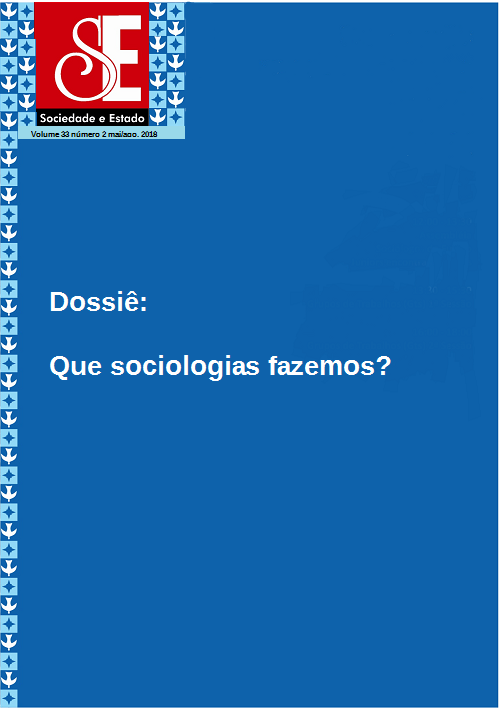Garfinkel’s studies in ethnomethodology:
exploring the moral foundations of modern public life
DOI:
https://doi.org/10.1590/s0102-699220183302008Keywords:
Contemporary sociological theory, Studies of etnomethodology, Garfinkel, Constitutive social facts, Social justice as a sociological questionAbstract
Editora Vozes has published a Portuguese translation of the new second edition of Studies in ethnomethodology. To celebrate that achievement I will talk about the importance of that book and of Garfinkel’s work more generally; in theoretical, methodological and political terms. I will argue that Garfinkel took up Durkheim’s project to make Sociology uniquely suited to the study of modernity and that this explains much of the misunderstanding of his work. I also want to announce the existence of Garfinkel’s Archive of which I am the Director and Intellectual Executor. There are materials in the Archive that should become the focus of important graduate theses and books. Work on the archive is being supported by the German government through a center at Siegen University in Germany called Media of Cooperation.
Garfinkel’s argument - like Durkheim’s - changes the epistemological terrain of social science, and hence the theoretical terrain of social argumentation. It shifts the domain of objects from natural to social objects - and the relevant social practices from norms, traditional rules and consensus - to constitutive practices. Because of the enormity of this shift, Ethnomethodology can only be understood by those with a theoretical grasp of what is involved. Otherwise, contradictions follow: as they have. The consequence of Garfinkel’s argument for understanding modern democratic politics is that any inequalities or exclusions that prevent people from being able to fulfill reciprocity conditions in interaction (his famous “Trust Conditions”) are a threat to coherence, meaning, and identity in modern democratic public life.
Downloads
References
BANNISTER, R. Sociology and scientism: the american quest for objectivity, 1880-1940. Chapel Hill (NC): University of North Carolina Press, 1987.
BRUNER, J. Acts of meaning. Cambridge (MA): Harvard University Press, 1990.
COSER L. Two methods in search of substance. American Sociological Review, v. 40, p. 691-700, 1975.
DURKHEIM, E. Suicide. London: Penguin, 1995 [1897].
---- . La division sociale du travail. Paris: Alcan, 1984 [1893].
---- . The elementary forms of the religious life. London: George Allen & Unwin Ltd., 1912.
GARFINKEL, H. Studies in ethnomethodology. 2. ed. London: Routledge Press. Portuguese translation by Editora Vozes, 2018 [1967].
---- . Seeing sociologically. Boulder (CO): Paradigm Publishers, 2006 [1948].
---- . Essays in ethnomethodology. Unpublished manuscript in the Garfinkel Archive, 1961-1962.
---- . Notes on the information apperception test. Unpublished manuscript in the Garfinkel Archive, 1947.
---- . Some reflections on action theory and the theory of social systems. Unpublished manuscript in the Garfinkel Archive, 1946.
---- . Inter and intra racial homicide. MA Thesis. Version published in Social Forces, 1949 [1942].
GOULDNER, A. The coming crisis of western sociology. New York: Basic Books, 1970.
HINKLE, R. Developments in american sociological theory 1915-1950. Albany (NY): State University of New York Press, 1994.
MACIVER. R. Presidential address: “Some reflections on sociology during a crisis”. AmericanSociological Review, v. 6, n. 1, p. 1-8, 1941.
MERTON, R. Durkheim’s division of labor in society. American Journal of Sociology, 40, n. 3, p. 319-328, Nov. 1934.
ODUM, H. Race and rumors of race: the American South in the early forties. Baltimore (MD): Johns Hopkins University Press, 1943.
PARSONS, T. Presidential address. “The prospects of sociological theory”. American Sociological Review, v. 15, n. 1, p. 3-16, 1949.
---- . The role of theory in social research. American Sociological Review, v. 3, n. 1 p. 13-20, 1938.
---- . The structure of social action. Chicago (IL):Free Press, 1933.
QUEEN, S. Presidential address. “Can sociologists face reality?” American Sociological Review, v. 7, n. 1, p. 1-12, 1942.
RAWLS, A. The wartime narrative in US sociology: stigmatizing qualitative sociology in the name of science. The European Journal of Sociology, p. 1-21, DOI 10.1177/1368431018754499, 2018.
---- . An essay on the intrinsic relationship between social facts and moral questions. Canadian Journal of Sociology, v. 54, n. 4, p. 392-404, 2017.
---- . Harold Garfinkel, ethnomethodology and workplace studies. Organization Studies. Special Symposium Issue. v. 29, n. 5, p. 701-732, 2008a.
---- . Epistemology and practice. Cambridge (MA): Cambridge University Press, 2008b [2004].
---- . Durkheim’s epistemology: the neglected argument. American Journal of Sociology, v. 102, n. 2 p. 430-482, 1996a.
---- . Durkheim’s epistemology: the initial critique 1915-1924. Sociological Quarterly, v. 38, n. 1, p. 111-145, 1996b.
REISMAN, David. The lonely crowd: a study of the changing American character. New Haven (CT): Yale University Press, 1950.
SANDERSON, D. Presidential address. “Sociology: a means to democracy”. American Sociological Review, v. 8, n. 1, p. 1-9, 1943.
TAYLOR, C. Presidential address: “Sociology and commonsense”. American Sociological Review, v. 12, n. 1, p. 1-9, 1947.
TURNER, S. A life in the first half-century of sociology: Charles Ellwood and the division of sociology. In: CALHOUN, C. (Ed.). Sociology in America: a history, p. 115-154. Chicago (IL): University ChicagoPress, 2005.
VANCE, R. Presidential address. “Toward social dynamics”. American Sociological Review, v. 10, n. 2, p. 123-127, 1945.
WEBER, M. The protestant ethic and the spirit of capitalism. New York: Scribner, 1905.
WINCH, P. The idea of a social science. London: Routledge & Kegan Paul, 1958.
WIRTH, L. Presidential address. “Consensus and mass communication”. American Sociological Review, v. 13, n. 1, p. 1-15, 1947.
WITTGENSTEIN, L. Philosophical investigations. Oxford (UK): Oxford University Press, 1953.
YOUNG, K. Presidential address. “Society and the state: some neglected areas of research and theory”. American Sociological Review, v. 11, n. 2, p. 137-146, 1946.
ZNANIECKI, F. Social actions. New York: Farrar & Rinehart, 1936.











